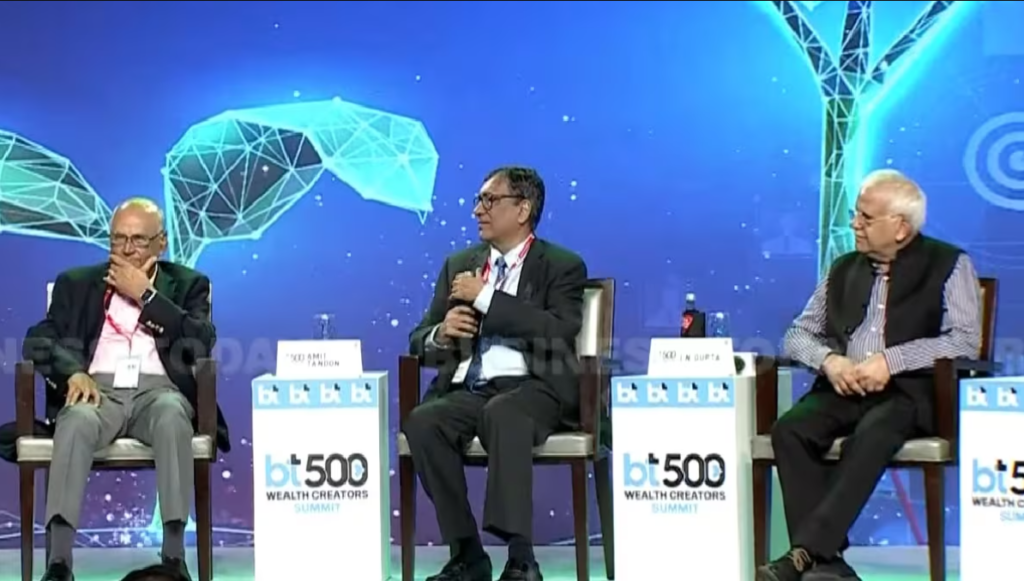BT500 Wealth Creators Summit: According to Amit Tandon, Founder and MD of Institutional Investor Advisory Services, the Companies Act did help, not just by introducing e-voting but also by requiring “majority of minority” approval.
Panelists at the BSE500 Wealth Creator Submit 2023 said on Wednesday that the advent of e-voting for shareholders, LODR laws, and increasing institutional investor involvement helped enhance the standard of corporate governance in India. According to JN Gupta, co-founder and MD of Stakeholders Empowerment Services, thousands of improvements have occurred to strengthen corporate governance over the last few decades, but the one reform that remains to be done is the implementation of everything, not in the letter but in the spirit. There is still a vacuum, he claims. Gupta feels that the new Companies Act, which allowed for e-voting and made it easier for investors to participate, is to blame for the increased efficacy of corporate governance in recent years.
“Previously, the meetings were held in Timbuktu or Jhumri Telaiya, and no one was present.” Participation has increased now that e-voting is available. The second factor is that, following lessons from the Companies Act, Sebi imposed LODR listing obligations, which have had an impact. Furthermore, the impact of increased voting has occurred in such a way that firms now fear the possibility of rejection. “Fear is now causing companies to listen to what stakeholders say,” Gupta explained.
Also Read: Mortgage Refinance Demand Has Increased By 19% Since Rates Fell To Their Lowest Level Since July

LODR is an acronym that stands for listing obligations and disclosure requirements. Gupta claimed that when he launched Stakeholders Empowerment Services in 2012, if his advising firm needed clarification, he would be disconnected. He claims that firms are now calling him and inquiring about about what he is writing. “The day the following of the law in spirit happens, I will probably not be needed,” Gupta said in a statement.

The emphasis on corporate governance has not recently acquired significance. According to G.N. Bajpai, former Chairman, the markets regulator has been working on corporate governance for a long time. Bajpai noted that when he joined it, the market was under what he called “animated suspension” due to severe market wrongdoing, necessitating a total re-orientation of all market operations. He referenced the Kumar Mangalam Birla Committee and the Narayana Murthy Committee, which introduced new disclosures, accounting rules, and boardroom practices.

“Over a period of time, successive chairs and their teams have improved upon these, and eventually it has landed on significantly high standards on disclosures and accountability,” Bajpai went on to say.

According to Amit Tandon, Founder & MD, Institutional Investor Advisory Services, the Companies Act did help by introducing not only e-voting but also the “majority of minority” approval. It introduced LODR, tightened LODR, and had this listing agreement, which made it much easier to implement regulatory changes through special and ordinary resolutions.

Then there was the Kotak committee, which focused on gatekeepers, auditors, and independent directions. Tandon mentioned that they were given more authority. Furthermore, the ownership structure of businesses has shifted dramatically. Tandon stated that before the financial crisis, Indian promoters controlled 60% of equity and promoters around 20%, which means that for every three shares held by promoters at the time, one share was owned by institutions. Tandon stated that promoters currently own 50% of the stock, while institutions own 35%.

“Institutional shareholders have started sitting at the high table, so to speak,” he added, adding that now you have institutional investors with huge pockets that own 8–9% of firm interests, up from 1-2% previously. Tandon believes that these investors cannot be disregarded. “With e-voting, every vote is now counted.” Tandon describes institutional investors as “much more engaged today.”

Tandon stated that when it comes to governance qualities, one should look at who the other investors are—the more institutional investors a corporation has, the greater governance quality one may expect. He claims that companies that communicate frequently are better regulated than those that do not communicate frequently.

Tandon stated that when it comes to governance qualities, one should look at who the other investors are—the more institutional investors a corporation has, the greater governance quality one may expect. He claims that companies that communicate frequently are better regulated than those that do not communicate frequently.
Click here, to check out the latest post on Instagram.
Also read: IREDA Share: Within 10 Days Of Listing, It’s Shares Tripled From Their IPO Price, How Much Higher Can They Go?
image source: google




































